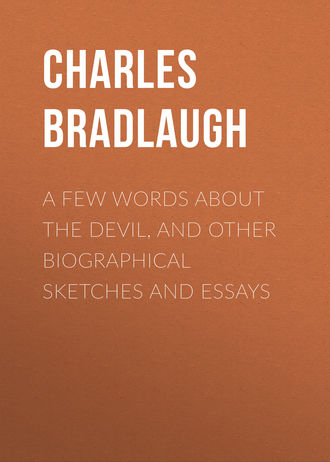 полная версия
полная версияA Few Words About the Devil, and Other Biographical Sketches and Essays
While Theism, asserting God as the creator and governor of the universe, hinders and checks man's efforts by declaring God's will to be the sole directing and controlling power, Atheism, by declaring all events to be in accordance with natural laws – that is, happening in certain ascertainable sequences – stimulates man to discover the best conditions of life, and offers him the most powerful inducements to morality. While the Theist provides future happiness for a scoundrel repentant on his death bed, Atheism affirms present and certain happiness for the man who does his best to live here so well as to have little cause for repenting hereafter.
Theism declares that God dispenses health and inflicts disease, and sickness and illness are regarded by the Theist as visitations from an angered Deity, to be borne with meekness and content. Atheism declares that physiological knowledge may preserve us from disease by preventing our infringing the law of health, and that sickness results not as the ordinance of offended Deity, but from ill-ventilated dwellings and workshops, bad and insufficient food, excessive toil, mental suffering, exposure to inclement weather, and the like – all these finding root in poverty, the chief source of crime and disease; that prayers and piety afford no protection against fever, and that if the human being be kept without food he will starve as quickly whether he be Theist or Atheist, theology being no substitute for bread.
When the Theist ventures to affirm that his God is an existence other than and separate from the so-called material universe, and when he invests this separate, hypothetical existence with the several attributes of omniscence, omnipresence, omnipotence, eternity, infinity, immutability, and perfect goodness, then the Atheist, in reply says, "I deny the existence of such a being."
It becomes very important, in order that injustice may not be done to the Theistic argument, that we should have – in lieu of a clear definition, which it seems useless to ask for – the best possible clue to the meaning intended to be conveyed by the word God. If it were not that the word is an arbitrary term, invented for the ignorant, and the notions suggested by which are vague and entirely contingent upon individual fancies, such a clue could be probably most easily and satisfactorily obtained by tracing back the word "God," and ascertaining the sense in which it was used by the uneducated worshipers who have gone before us; collating this with the more modern Theism, qualified as it is by the superior knowledge of to-day. Dupuis says: "The word God appears intended to express the force universal, and eternally active, which endows all nature with motion according to the laws of a constant and admirable harmony; which develops itself in the diverse forms of organized matter, which mingles with all, gives life to all; which seems to be one through all its infinitely varied modifications, and inheres in itself alone."
In the "Bon Sens" of Cure Meslier, it is asked, "Qu'est ce que Dieu?" and the answer is: "It is an abstract word coined to designate the hidden force of Nature, or rather it is a mathematical point having neither length, breadth, nor thickness."
The orthodox fringe of the Theism of to-day is Hebraistic in its origion – that is, it finds its root in the superstition and ignorance of a petty and barbarous people nearly destitute of literature, poor in language, and almost entirely wanting in high conceptions of humanity. It might, as Judaism is the foundation of Christianity, be fairly expected that the ancient Jewish Records would aid us in our search after the meaning to be attached to the word "God." the most prominent words in Hebrew rendered God or Lord in English are [ – ] Jeue, and [ – ] Aleim. The first word, Jeue, called by our orthodox Jehovah, is equivalent to "that which exists," and indeed embodies in itself the only possible trinity in unity – i. e. past, present, and future. There is nothing in this Hebrew word to help you to any such definition as is required for the sustenance of modern Theism. The most you can make of it by any stretch of imagination is equivalent to the declaration "I am, I have been, I shall be." The word [ – ] is hardly ever spoken by religious Jews, who actually in reading substitute for it, Adonai, an entirely different word. Dr. Wall notices the close resemblance in sound between the word Yehowa or Yeue, or Jehovah, and Jove. In fact [ – ], Jupiter and Jeue, pater, (God the father) present still closer resemblance in sound. Jove is also [ – ] or [ – ] or [ – ], whence the word Deus and our Deity. The Greek mythology, far more ancient than that of the Hebrews, has probably found for Christianity many other and more important features of coincidence than that of a similarly sounding name. The word [ – ] traced back affords us no help beyond that it identifies Deity with the universe. Plato says that the early Greeks thought that the only Gods were the sun, moon, earth, stars and heaven. The word Aleim, assists us still less in defining the word God, for Parkhurst translates it as a plural noun signifying "the curser," deriving it from the verb to curse. Finding that philology aids us but little, we must endeavor to arrive at the meaning of the word "God" by another rule. It is utterly impossible to fix the period of the rise of Theism among any particular people, but it is, notwithstanding, comparatively easy, if not to trace out the development of Theistic ideas, at any rate to point to their probable course of growth among all peoples.
Keightley, in his "Origin of Mythology," says: "Supposing, for the sake of hypothesis, a race of men in a state of total or partial ignorance of Deity, their belief in many gods may have thus commenced. They saw around them various changes brought about by human agency, and hence they knew the power of intelligence to produce effects. When they beheld other and greater effects, they ascribed them to some unseen being, similar but superior to man." They associated particular events with special unknown beings (gods), to each of whom they ascribed either a peculiarity of power, or a sphere of action not common to other gods. Thus one was god of the sea, anothor god of war, another god of love, another ruled the thunder and lightning; and thus through the various elements of the universe and passions of humankind, so far as they were then known.
This mythology became modified with the advancement of human knowledge. The ability to think has proved itself oppugnant to and destructive of the desire to worship. Science has razed altar after altar heretofore erected to the unknown gods, and pulled down deity after deity from the pedestals on which ignorance and superstition had erected them. The priest who had formerly spoken as the oracle of God lost his sway, just in proportion as the scientific teacher succeeded in impressing mankind with a knowledge of the facts around them. The ignorant who had hitherto listened unquestioning during centuries of abject submission to their spiritual preceptors, at last commenced to search and examine for themselves, and were guided by experience rather than by church doctrine. To-day it is that advancing intellect which challenges the reserve guard of the old armies of superstition, and compels a conflict which humankind, must in the end have great gain by the forced enunciation of the truth.
From the word "God" the Theist derives no argument in his favor; it teaches nothing, defines nothing, demonstrates nothing, explains nothing. The Theist answers that this is no sufficient objection, that there are many words which are in common use to which the same objection applies. Even admitting that this were true, it does not answer the Atheist's objection. Alleging a difficulty on the one side is not a removal of the obstacle already pointed out on the other.
The Theist declares his God to be not only immutable, but also infinitely intelligent, and says: "Matter is either essentially intelligent, or essentially non-intelligent; if matter were essentially intelligent, no matter could be without intelligence; but matter can not be essentially intelligent, because some matter is not intelligent, therefore matter is essentially non-intelligent: but there is intelligence, therefore there must be a cause for the intelligence, independent of matter; this must be an intelligent being – i.e… God." The Atheist answers, I do not know what is meant, in the mouth of the Atheist, by "matter." "Matter," "substance," "existence," are three words having the same signification in the Atheist's vocabulary. It is not certain that the Theist expresses any very clear idea when he uses the words "matter" and "intelligence." Reason and understanding are sometimes treated as separate faculties, yet it is not unfair to presume that the Theist would include them both under the word intelligence. Perception is the foundation of the intellect. The perceptive faculty, or perceptive faculties, differs or differ in each animal, yet in speaking of matter that Theist uses the word "intelligence" as though the same meaning were to be understood in every case. The recollection of the perceptions is the exercise of a different faculty from the perceptive faculty, and occasionally varies disproportionately; thus an individual may have great perceptive faculties, and very little memory, or the reverse, yet memory, as well as perception, is included in intelligence. So also the faculty of comparing between two or more perceptions; the faculty of judging and the faculty of reflecting – all these are subject to the same remarks, and all these and other faculties are included in the word intelligence. We answer, then, that "God" (whatever that word may mean) can not be intelligent. He can never perceive; the act of perception results in the obtaining a new idea, but if God be omniscient his ideas have been eternally the same. He has either been always and always will be perceiving, or he has never perceived at all. But God can not have been always perceiving, because if he had he would always have been obtaining fresh knowledge, in which case he must have some time had less knowledge than now; that is he would have been less perfect; that is, he would not have been God: he can never recollect or forget, he can never compare, reflect nor judge. There can not be perfect intelligence without understanding; but following Coleridge, "understanding is the faculty of judging according to sense." The faculty of whom? Of some person, judging according to that person's senses? But has "God" senses? Is there anything beyond "God" for "God" to sensate? There can not be perfect intelligence without reason. By reason we mean that faculty or aggregation of faculties which avails itself of past experience to predetermine, more or less accurately, experience in the future, and to affirm truths which sense perceives, experiment verifies, and experience confirms. To God there can be neither past nor future, therefore to him reason is impossible. There can not be perfect intelligence without will, but has God will? If God wills, the will of the all-powerful must be irresistible; the will of the infinite must exclude all other wills.
God can never perceive. Perception and sensation are identical. Every sensation is accompanied by pleasure or pain. But God, if immutable, can neither be pleased nor pained. Every fresh sensation involves a change in mental and perhaps in physical condition. God, if immutable, can not change. Sensation is the source of all ideas, but it is only objects external to the mind which can be sensated. If God be infinite there can be no objects external to him, and therefore sensation must be to him impossible. Yet without perception where is intelligence?
God can not have memory or reason – memory is of the past, reason for the future, but to God immutable there can be no past, no future. The words past, present, and future, imply change; they assert progression of duration. If God be immutable, to him change is impossible. Can you have intelligence destitute of perception, memory, and reason? God can not have the faculty of judgment – judgment implies in the act of judging a conjoining or disjoining of two or more thoughts, but this involves change of mental condition. To God, the immutable, change is impossible. Can you have intelligence, yet no perception, no memory, no reason, no judgment? God can not think. The law of the thinkable is that the thing thought must be separated from the thing which is not thought. To think otherwise would be to think of nothing – to have an impression with no distinguishing mark, would be to have no impression. Yet this separation implies change, and to God, immutable, change is impossible. Can you have intelligence without thought? If the Theist replies to this that he does not mean by infinite intelligence as an attribute of Deity an infinity of the intelligence found in a finite degree of humankind, then he is bound to explain, clearly and distinctly, what other "intelligence" he means, and until this be done the foregoing statements require answer.
The Atheist does not regard "substance" as either essentially intelligent or the reverse. Intelligence is the result of certain conditions of existence. Burnished steel is bright – that is, brightness is the necessity of a certain condition of existence. Alter the condition, and the characteristic of the condition no longer exists. The only essential of substance is its existence. Alter the wording of the Theist's objection. Matter is either essentially bright, or essentially non-bright. If matter were essentially bright, brightness should be the essence of all matter; but matter can not be essentially bright, because some matter is not bright, therefore matter is essentially non-bright; but there is brightness, therefore there must be a cause for this brightness independent of matter; that is, there must be an essentially bright being – i.e., God.
Another Theistic proposition is thus stated: "Every effect must have a cause; the first cause universal must be eternal: ergo, the first cause universal must be God." This is equivalent to saying that "God" is "first cause." But what is to be understood by cause? Defined in the absolute, the word has no real value. "Cause," therefore, cannot be eternal. What can be understood by "first cause?" To us the two words convey no meaning greater than would be conveyed by the phrase "round triangle." Cause and effect are correlative terms – each cause is the effect of some precedent; each effect the cause of its consequent. It is impossible to conceive existence terminated by a primal or initial cause. The "beginning," as it is phrased, of the universe, is not thought out by the Theist, but conceded without thought. To adopt the language of Montaigne, "Men make themselves believe that they believe." The so-called belief in Creation is nothing more than the prostration of the intellect on the threshold of the unknown. We can only cognize the ever-succeeding phenomena of existence as a line in continuous and eternal evolution. This line has to us no beginning; we trace it back into the misty regions of the past but a little way; and however far we may be able to journey, there is still the great beyond Then what is meant by "universal cause?" Spinoza gives the following definition of cause, as used in its absolute signification: "By cause of itself I understand that, the essence of which involves existence, or that, the nature of which can only be considered as existent." That is, Spinoza treats "cause" absolute and "existence" as two words having the same meaning. If his mode of defining the word be contested, then it has no meaning other than its relative signification, of a means to an end. "Every effect must have a cause." Every effect implies the plurality of effects, and necessarily that each effect must be finite; but how is it possible from a finite effect to logically deduce a universal, i.e., infinite, cause?
There are two modes of argument presented by Theists, and by which, separately or combined, they seek to demonstrate the being of a God. These are familiarly known as the arguments a priori and a posteriori.
The a posteriori argument has been popularized in England by Paley, who has ably endeavored to bide the weakness of his demonstration under an abundance of irrelevant illustration. The reasoning of Paley is very deficient in the essential points where it most needed strength. It is utterly impossible to prove by it the eternity or infinity of Deity. As an argument founded on analogy, the design argument, at the best, could only entitle its propounder to infer the existence of a finite cause, or, rather, of a multitude of finite causes. It ought not to be forgotten that the illustrations of the eye, the watch, and the man, even if admitted as instances of design, or, rather, of adaptation, are instances of eyes, watches, and men, designed or adapted out of pre-existing substance, by a being of the same kind of substance, and afford, therefore, no demonstration in favor of a designer, alleged to have actually created substance out of nothing, and also alleged to have created a substance entirely different from himself. The a posteriori argument can never demonstrate infinity for Deity. Arguing from an effect finite in extent, the most it could afford would be a cause sufficient for that effect, such cause being possibly finite in extent and duration. And as the argument does not demonstrate God's infinity, neither can it, for the same reason, make out his omniscience, as it is clearly impossible to logically claim infinite wisdom for a God possibly only finite. God's omnipotence remains unproved for the same reason, and because it is clearly absurd to argue that God exercises power where he may not be. Nor can the a posteriori argument show God's absolute freedom, for, as it does nothing more than seek to prove a finite God, it is quite consistent with the argument that God's existence is limited and controlled in a thousand ways. Nor does this argument show that God always existed; at the best the proof is only that some cause, enough for the effect, existed before it, but there is no evidence that this cause differs from any other causes, which are often as transient as the effect itself. And as it does not demonstrate that God has always existed, neither does it demonstrate that he will always exist, or even that he now exists. It is perfectly in accordance with the arguement, and with the analagy of cause and effect that the effect may remain after the cause has ceased to exist. Nor does the argument from design demonstrate one God. It is quite consistent with this argument that a separate cause existed for each effect, or mark of design, discovered, or that several causes contributed to some or one of such effects. So that if the argument be true, it might result in a multitude of petty deities, limited in knowledge, extent, duration, and power; and, still worse, each one of this multitude of gods may have had a cause which would also be finite in extent and duration, and would require another, and so on, until the design argument loses the reasoner among an innumerable crowd of deities, none of whom can have the attributes claimed for God.
The design argument is defective as an argument from analogy, because it seeks to prove a Creator God who designed, but does not explain whether this God has been eternally designing, which would be absurd; or, if he at some time commenced to design, what then induced him so to commence. It is illogical, for it seeks to prove an immutable Deity by demonstrating a mutation on the part of Deity.
It is unnecessary to deal specially with each of the many writers who have used from different standpoints the a posteriori form of argument in order to prove the existence of Deity. The objections already stated apply to the whole class; and, although probably each illustration used by the theistic advocate is capable of an elucidation entirely at variance with his argument, the main features of objection are the same. The argument a posteriori is a method of proof in which the premises are composed of some position of existing facts, and the conclusion asserts a position antecedent to those facts. The argument is from given effects to their causes. It is one form of this argument which asserts that man has a moral nature, and from this seeks to deduce the existence of a moral governor. This form has the disadvantage that its premises are illusory. In alleging a moral nature for man, the Theist overlooks the fact that the moral nature of man differs somewhat in each individual, differs considerably in each nation, and differs entirely in some peoples. It is dependent on organization and education: these are influenced by climate, food, and mode of life. If the argument from man's nature could demonstrate anything, it would prove a murdering God for the murderer, a lascivious God for the licentious man, a dishonest God for the thief, and so through the various phases of human inclination. The a priori arguments are methods of proof in which the matter of the premises exists in the order of conception antecedently to that of the conclusion. The argument is from cause to effect. Among the prominent Theistic advocates relying upon the a priori argument in England are Dr. Samuel Clarke, the Rev. Moses Lowman, and William Gillespie. As this last gentleman condemns his predecessors for having utterly failed to demonstrate God's existence, and as his own treatise on the "Necessary Existence of God" comes to us certified by the praise of Lord Brougham and the approval of Sir William Hamilton, it is to Mr. William Gillespie that the reader shall be directed.
The propositions are first stated entirely, so that Mr. Gillespie may not complain of misrepresentation:
1. Infinity of extension is necessarily existing.
2. Infinity of extension is necessarily indivisible. Corollary. – Infinity of extension is necessarily immovable.
3. There is necessarily a being of infinity of extension.
4. The being of infinity of extension is necessarily of unity and simplicity.
Sub-proposition. – The material universe is finite in extension.
5. There is necessarily but one being of infinity of expansion.
Part 2, Proposition 1. – Infinity of duration is necessarily existing.
2. Infinity of duration is necessarily indivisible. Corollary. – Infinity of duration is necessarily immovable.
3. There is necessarily a being of infinity of duration.
4. The being of infinity of duration is necessarily of unity and simplicity.
Sub-proposition. – The material universe is finite in duration.
Corollary. – Every succession of substances is finite in duration.
5. There is necessarily but one being of infinity of duration.
Part 3, Proposition 1. – There is necessarily a being of infinity of expansion and infinity of duration.
2. The being of infinity of expansion and infinity of duration is necessarily of unity and simplicity.
Division 2, Part 1. – The simple sole being of infinity of expansion and of duration is necessarily intelligent and all-knowing.
Part 2. – The simple sole being of infinity of expansion and of duration, who is all-knowing, is necessarily all-powerful.
Part 3. – The simple sole being of infinity of expansion and of duration, who is all-knowing and all-powerful, is necessarily entirely free.
Division 3. – The simple sole being of infinity of expansion and of duration, who is all-knowing, all-powerful, and entirely free, is necessarily completely happy.
Sub-proposition. – The simple sole being of infinity of expansion and of duration, who is all-knowing, all-powerful, entirely free, and completely happy, is necessarily perfectly good.
The first objection against the foregoing arguments is that it seeks to prove too much. It affirms one existence (God) infinite in extent and duration, and another entirely different and distinct existence (the material universe) finite in extent and duration. It therefore seeks to substantiate everything and something more. The first proposition is curiously worded, and the argument to demonstrate it is undoubtedly open to more than one objection.
Mr. Gillespie has not defined infinity, and it is possible therefore his argument may be misapprehended in this paper. Infinite signifies nothing more than indefinite. When a person speaks of infinite extension he can only mean to refer to the extension of something to which he has been unable to set limits. The mind can not conceive extension per se, either absolute or finite. It can only conceive something extended. It might be impossible mentally to define the extension of some substance. In such a case its extension would be indefinite; or, as Mr. Gillespie uses the word, infinite. No one can therefore possibly have any idea of infinity of extension. Yet it is upon the existence of such an idea, and on the impossibility of getting rid of it, that Mr. Gillespie grounds his first proposition. If the idea does not exist, the argument is destroyed at the first step.








